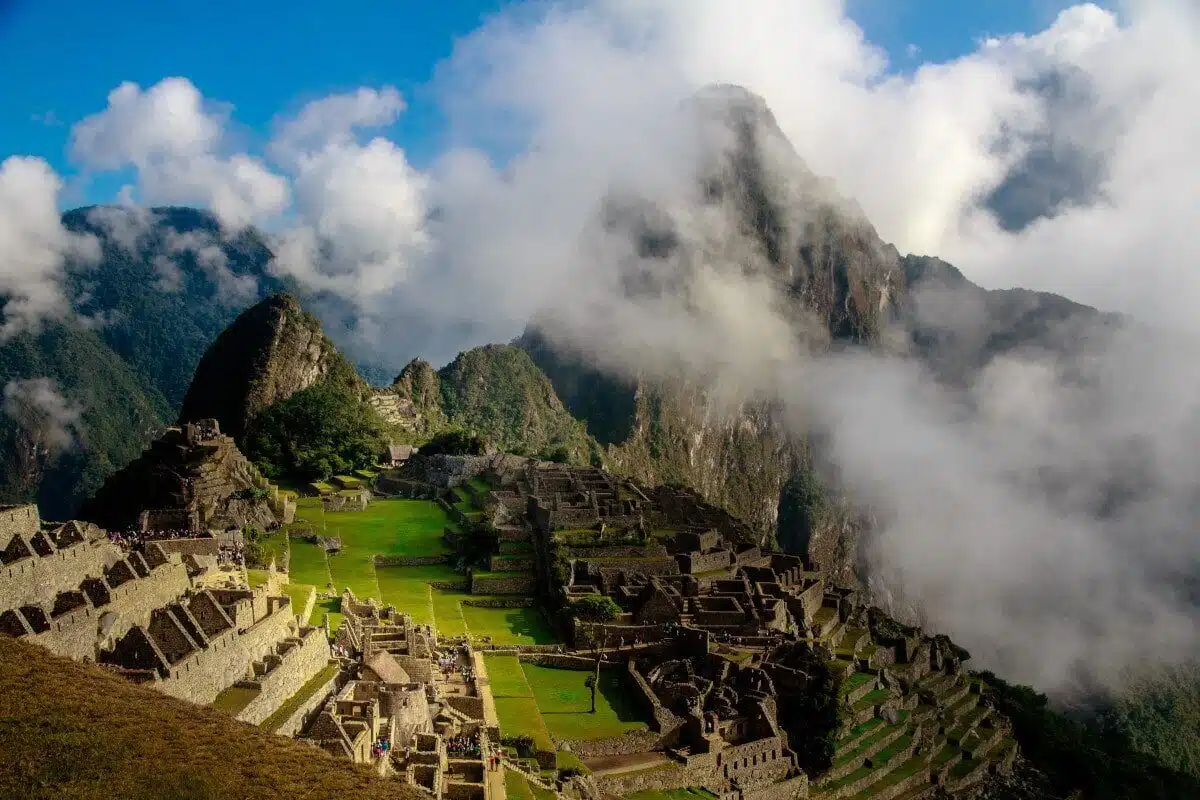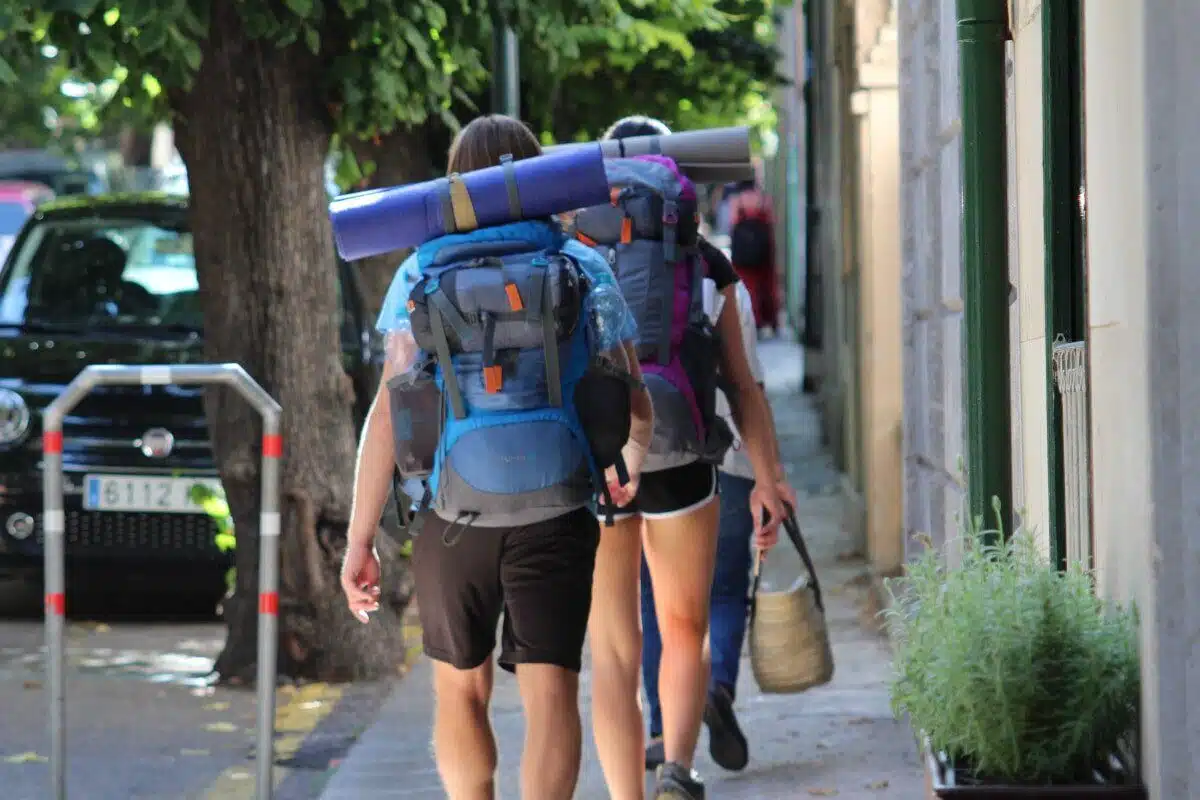
Want to learn more about responsible tourism? I hope this post helps!
You love travelling to faraway places and experiencing a renewed outlook on life.
You’ve backpacked, camped, and hiked across forests, rivers, and mountaintops with a sense of awe and appreciation.
…But have you ever stopped to consider the impact travelling might have on the world?
While the majority of tourists I know respect the “leave no trace” rule, others still cause immeasurable damage in their attempts to globe-trot and sightsee.
That’s where responsible tourism comes in.
But what does this term mean and how can you make sure you’re practicing it?
I wanted to take a closer look at what it takes to be a responsible traveller so we can all explore the world in the most compassionate and considerate way.
Enjoy!
Responsible travel helps preserve the beautiful places around the world (like Machu Picchu!). But what is responsible tourism exactly? Let’s investigate…
Interested in responsible travel? You might like these posts too:
- 10 Primary Disadvantages of Tourism
- A Complete Guide to Eco Travelling
- 40 Different Types of Tourism
- 20 Benefits of Solo Travel
- The Best Jobs for Adventurers
- 50 Fascinating Facts About Travel
- 85+ Road Trip Trivia Questions & Games
- 75 Essential Things to Pack for Travel
- Key Features of the Experience of Travel
What Is Responsible Tourism?
At its core, responsible tourism is a practice that centres on two main ideas.
Put simply, it encourages all travellers and tourists (AKA, people like me and you) to:
- Make the world a better place to live
- Make the world a better place to visit
While this mindset has been around for decades, it wasn’t given a name until the 2002 World Summit on Sustainable Development, held in Cape Town, South Africa.
At that time, global leaders in the field of world travel developed what’s now known as the “Cape Town Declaration”, proclaiming the two tenets above.
While it can take many forms, responsible tourism is characterized by a few common behaviours.
As you go on your adventures, look for ways to emulate these whenever and wherever you can. They include:
- Minimizing any negative economic, environmental, or social impact
- Involving local people in decisions that have a direct effect on their lives
- Creating economic benefits for local people
- Enhancing the well-being of your host communities
- Forging meaningful connections with local people to better understand cultural, social, and environmental issues
- Remaining culturally sensitive and respecting local pride
In addition to tourists themselves, there are others in the travel industry who also bear the weight of following and spreading responsible tourism.
They include:
- Tour operators
- Hoteliers
- Government leaders
- Local people
Being a responsible traveller means understanding how this practice works and looking for ways to implement it.
While it’s always nice to visit other places, we want to make sure we’re leaving those spots better than how we found them, and not the other way around.
With the basic definition down, let’s take a look at how to be a responsible traveller.
How to Be a Responsible Traveller
It can be difficult to travel responsibly if you don’t know where to start.
Suddenly, you might second-guess every action and decision you make, wondering if it’s causing more harm than good.
Take a deep breath! Chances are, you’re already plenty respectful. However, there are ways to become even more responsible as you take in the world. Let’s take a look at a few simple ways you can start today.
1. Respect and Immerse Yourself in Local Culture
The more widespread you cast your travel net, you’ll soon find that there are people and places all around the world that look nothing like your view from home.
As such, you’ll understandably have your camera or smartphone with you at every turn, snapping away as you try to take it all in.
As you do, take into consideration how it might make the local people feel.
Their face shouldn’t wind up on your Instagram stories just because you thought it would garner a ton of likes. Nor should their homes be plastered on your Facebook timeline as you quickly pass through their community.
Instead of gawking at their surroundings and moving on to the next scene, consider stopping to get to know them instead.
You might make some of your most interesting, longest-lasting friendships this way!
Take a cooking class, and learn their native cuisine. Let them show you how to make beautiful pottery, baskets, or jewellery in a way that only they know how.
In other words, learn from them and show a true interest in them, respecting that while the trip might feel like an escape for you, it’s their reality and their homeland.
Want to travel responsibly? Try staying more than one night in each destination. Here’s how it’d make a difference:
2. Stay More Than One Night
Despite its many challenges, there’s no denying the economic impact of global travel.
In fact, the most recent World Travel & Tourism Economic Impact Report reveals that until the impact of COVID-19 in 2020, the travel and tourism sector contributed 10.4% to the global gross domestic product (GDP).
Whether you stay in a hostel, hotel, campsite, or any other type of lodging, you naturally contribute to the local economy as you move from one location to the next. In addition to overnight stays, you’re also paying for food, amenities, entertainment, gasoline, and more.
To maximize your positive impact, consider staying more than one night in each spot.
This way, you can centralize your spending and truly make a difference, rather than spreading it out in small amounts across multiple locations.
3. Contribute to the Local Economy
Along the same lines, try to shop, eat, and stay local whenever you can.
Sure, you might be able to find a fast-food chain restaurant in plenty of places around the world, but consider the impact that your dollar makes there.
Then, consider how much farther it will go when you invest it back into the local economy.
How else can you do your part financially?
- Purchase handcrafted souvenirs and gifts while you’re in town, rather than waiting until you get to the airport gift shop.
- Hire a local tour guide to show you the insider way around, rather than hopping on a megabus for a bird’s eye view of all the hotspots.
- Book a farm-stay and support an agricultural business with your time and money.
…Ultimately, the items you buy and the experiences you have will be much richer when you keep your focus local.
Plus, you’ll generate economic benefits, encourage local pride, and enhance the overall wellbeing of the community.
Part of being a responsible tourist is moving away from polluting forms of transport (like cruise ships) to more eco-friendly ones…
4. Travel on Foot (Where Possible)
The World Tourism Organization (UNWTO) estimates that transport-related emissions related to tourism will account for 5.3% of all man-made carbon dioxide emissions by 2030.
While it might not always be feasible to travel around on foot, look for ways to do so whenever possible. This way, you can minimize your environmental impact and help improve the local air quality.
If this isn’t an option, look for ways to support the local transportation system, hopping on public buses or trains rather than renting a car for the day.
Understand the Implications of Animal Tourism
You don’t have to participate in a big-game hunt to be directly involved in animal tourism.
While those types of excursions are undoubtedly harmful to the local wildlife population, the greater dangers are the nuanced experiences that don’t seem harmful at first.
For instance, consider those local shows that advertise Insta-worthy snaps of snakes, parrots, and other exciting, exotic animals.
For a small fee, you can hold a monkey, feed an ostrich, or engage in other behaviours that are generally not safe for the creature’s wellbeing.
Unfortunately, you may even encounter these opportunities from locals, seeking to make a quick buck off tourists who want a “once-in-a-lifetime” experience.
Even if the animals appear to be healthy and well-kept, there could be unsavoury practices going on behind the scenes.
This is especially true for bigger animals, such as horses and elephants, which tourists ride for a quick thrill. Often, they’re left standing for hours in the heat, and are worked until the point of exhaustion.
In short, it just isn’t worth it.
Animals aren’t meant for our entertainment, and any entity that markets them as such isn’t following the rules of responsible travel.
Responsible tourist tip #5: be conscious of your water consumption!
5. Respect Local Water Use
Being a mindful guest means more than simply picking up after yourself and keeping a tidy room.
It also means paying close attention to that small hanger or sign that you’ll often see in your hotel bathroom.
Chances are, you’ve seen at least one of these.
They tell you to put your towels and washcloths on the floor if you want them changed out for new ones. Otherwise, leave them hanging if you plan to use them another time.
It might not seem like a major deal, but that one decision can have a huge impact.
Studies show that on-site laundry operations account for 16% of a hotel’s total water usage. Minimizing that amount by even a small percentage can make a big difference.
Consider the case of Caesars Palace in Las Vegas, NV.
Once the hotel upgraded to more efficient laundry facilities and started communicating its water conservation efforts to guests, it saved around 30 million gallons of water per year.
That change alone saved the facility up to $218,000 per year.
Last but not least in the realm of responsible tourism: leave no trace…especially in natural areas!
Clean Up Natural Areas (Responsible Travel 101!)
Do you love going on hikes or taking nature trails to discover gorgeous vistas?
As you walk, look around for debris or trash that might be littering the path or nearby areas.
Do your part to curb this trend by saving your own trash until you find a designated trash bin. Even a small protein bar wrapper or sandwich bag can contribute to the waste that’s piling up in even the most remote places.
Start Your Own Responsible Tourist Journey
Whether you’re an avid and experienced traveller or you’re just starting out, it’s never too late to start implementing the basics of responsible tourism.
Above all, this is a practice that keeps local culture top of mind. It means considering every decision from their viewpoint and doing your best to engage in behaviours that are respectful and reverent at every turn.
Looking for another way to travel more thoughtfully and intentionally?
Check out my post on heritage tourism today!





